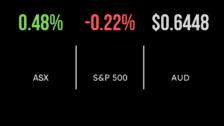“Nothing to see here” as inflation consensus builds
Inflation has dominated the headlines in May, with one higher-than-anticipated print in the US triggering a broad consensus that the Federal Reserve is wrong, and will be forced to act far quicker than expected. Yet as with most economic “consensus,” it’s important to look beyond the headlines.
This is what respected government bond manager Jamieson Coote has been seeking to achieve through its ‘Over the inflation hill’ series of white papers. The group, which manages over $4.6 billion worth of high-quality global bonds, recently released part two of this series, titled ‘Deflation megatrends are here to stay.’
The headline is somewhat self-explanatory, with the team seeking to understand the potential sources of “future systemic inflation” and assess the accuracy of the current consensus. According to the paper, “multiple deflationary forces have been driving pricing power for a long time and there is little likelihood of them reversing in the near future.”
Jamieson Coote highlights ageing demographics in the developed world, high debt levels, the automation of work and under-utilised labour as the key drivers of the deflationary decade we have just seen. And in its view not only do these drivers remain in place, but many have markedly accelerated.
“Debt levels all over the world have skyrocketed” supported by government stimulus, “technology has leapt forward into the future,” with Zoom and Microsoft Teams likely to reduce the need for business travel, and supply chains have diversified away from China, with companies becoming more global, not less.
The increase in indebtedness and growing levels of “zombie corporate funding” will likely make it near-impossible to raise interest rates too quickly.
These themes are “deeply entrenched” says Jamieson Coote, suggesting that “the overarching movement of lower pricing will remain the status quo.” That said, the firm agrees that short-term supply blockages will take time to clear, influencing base calculations of inflation, but it shares the view that these will be transitory.
The only potential threat to these long-term deflationary forces is a movement from a “new political class” to either redistribute the gains of owners of capital or to “curtail immigration of cheap labour” which has ultimately stymied wage growth in places like Australia, the US and the UK.
Concluding, the reports suggest it is “critical to see through the effects of shorter-term price volatility and reflect on the range of profound, slower-moving global themes or megatrends.”
“Secular themes do not change quickly” and therefore should not be ignored as they have been in recent weeks, says Jamieson Coote. A look beyond the headlines and into the real economy suggests the pain in Main Street remains, despite signs that Wall Street has returned to normal.










